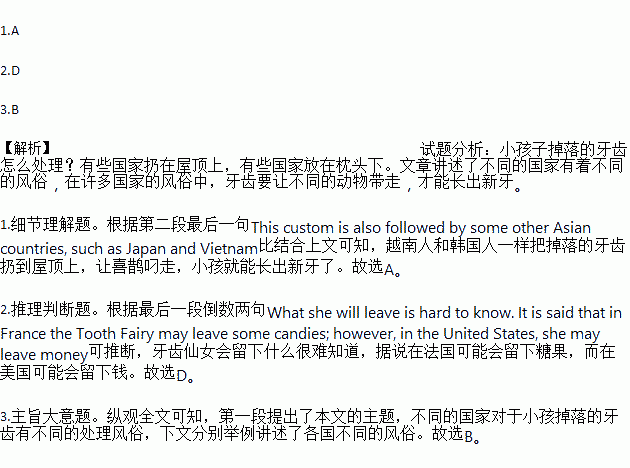题目内容
Many countries follow special customs when a child’s baby teeth fall out. Many of these customs tell stories about animals taking the teeth.
For example, Koreans have the custom of throwing the fallen tooth onto the roof of a house so that a magpie (喜鹊) can take the tooth away and bring a new tooth for the child. This custom is also followed by some other Asian countries, such as Japan and Vietnam.
Other countries, though, have tooth customs about other animals. In Mexico and Spain, for example, it is thought that a mouse takes a fallen tooth away and leaves some money. But in Mongolia, it is dogs that take children’s teeth away. Dogs are highly respected in Mongolian culture. It is believed that the new tooth will grow strong if the baby tooth is fed to a dog, so parents in Mongolia will put their children’s fallen teeth in a piece of meat and feed it to a dog.
In France and the USA, a child will put a fallen tooth under his or her pillow before going to bed. It is thought that in the early morning, when the child is still sleeping, the Tooth Fairy will take the tooth away and leave something else under the pillow. What she will leave is hard to know. It is said that in France the Tooth Fairy may leave some candies; however, in the United States, she may leave money.
1.In Vietnam, if a child’s tooth falls out, he or she will __________.
A. throw it onto the roof of a house
B. feed it to a mouse
C. put it in a piece of meat and feed the meat to a dog
D. leave it to the Tooth Fairy
2.From the last paragraph, we can know that in France and the USA _________.
A. a child will put his or her fallen tooth beside the pillow
B. the Tooth Fairy takes the fallen teeth away at midnight
C. the Tooth Fairy will leave some candies to the children after taking the fallen teeth away
D. no one knows for sure what the Tooth Fairy will leave to the children after taking the fallen teeth away
3.The passage is mainly about ___________.
A. customs about fallen teeth in western countries
B. customs about fallen teeth in different countries
C. stories about human teeth
D. stories about some animals
Autumn is a time when nature prepares to test and it is just the same with many people.With less energy or strength they have no desire to meet with friends after work,preferring to sit still in front of the television before going to bed early.And the next morning they find it hard to get up, too.
For most people, this period of time passes without any major effects, but a small minority suffer from complete winter depression(压抑).Apart from tiredness and without energy, the latter often has the following symptoms(症状).
They have an increased need for sleep and also for sweet food like chocolate.Normally, depression is along with difficulty in falling asleep and loss of appetite(胃口).
True winter depression exists when the symptoms occur repeatedly in autumn and winter.Moreover, they have to last at least two weeks.Symptoms of winter depression begin for northern hemisphere(北半球)countries in October, November or December, and reduce in January.The symptoms decrease when the days grow longer again.
Lack of light during the cold months is the cause of people's depression.
To reduce the bad effect of the winter depression, sufferers should spend as much time outdoors as possible.Exercise is also a tested cure for depression.A regular sleep wake cycle can help too, and sufferers should stick to it even at weekends.By getting up early, they can receive more daylight regardless of the weather.
Title | Light up your life |
Main idea | People who 1. from winter depression can light up their life. |
2. | ·Feel tired. ·Lack 3.. ·Need more sleep and sweet food. ·Find it 4. to go to sleep. ·Have no 5. to have meals. |
Occurrence | ·Winter depression exists with the symptoms occurring over and over again in autumn and winter, and 6. two weeks or longer. ·Winter depression starts for northern hemisphere countries in October, November or December and 7. in January. |
Cause | ·8. to lack of light in cold weather |
Solutions | ·Spend as much time outdoors as 9.. ·Take exercise. ·Go to bed and get up 10. every day. |

